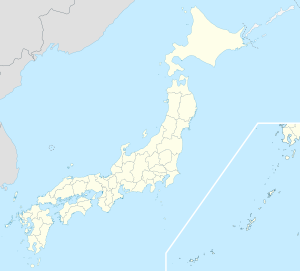Tsukuba (Ibaraki)
| Tsukuba-shi つ く ば 市 |
||
|---|---|---|
| Geographical location in Japan | ||
|
|
||
| Region : | Kanto | |
| Prefecture : | Ibaraki | |
| Coordinates : | 36 ° 5 ' N , 140 ° 7' E | |
| Basic data | ||
| Surface: | 284.07 km² | |
| Residents : | 240,987 (October 1, 2019) |
|
| Population density : | 848 inhabitants per km² | |
| Community key : | 08220-1 | |
| Symbols | ||
| Flag / coat of arms: | ||
| Tree : | Japanese zelkove | |
| Flower : | Creeping Saxifrage | |
| Bird : | Ural Owl | |
| town hall | ||
| Address : |
Tsukuba City Hall 4741 Yatabe Tsukuba -shi Ibaraki 305-8555 |
|
| Website URL: | http://www.city.tsukuba.ibaraki.jp | |
| Location of Tsukubas in Ibaraki Prefecture | ||
Tsukuba ( Japanese つ く ば 市 , -shi ) is a city in Ibaraki Prefecture on Honshū , the main island of Japan . Tsukuba is located around 60 km northeast of Tokyo .
The National Land Survey of Japan ( Kokudo Chiriin ) has its main office in Tsukuba.
geography
Nearby is the famous Tsukuba Mountain .
Attractions
traffic
- Street:
- Jōban highway to Tokyo or Iwaki
- National road 6 to Chūō or Sendai
- National Road 125 to Katori or Kumagaya
- National Road 354 to Takasaki or Hokota
- National Road 408 to Narita or Takanezawa
- Train:
- Tsukuba Express (TX) to Akihabara (Tokyo)
- bus
- Direct line to Tokyo Narita Airport
- Direct line to Haneda Airport
education
The city was planned as the "City of Science" in the early 1960s and built from 1970 onwards. There are three universities here , Tsukuba University , Tsukuba Gakuin University and the medical faculty of Tsukuba University Hospital, over 300 state and private research institutes, as well as a large number of companies in the high-tech industry. In 1985, the Tsukuba International Exhibition took place in Tsukuba from March 17th to September 16th under the motto “Apartments and the environment - science and technology for people at home”. A year later the Tsukuba Expo Center was opened as a science museum, and the Kagaku Bampaku Kinen Kōen (Expo Memorial Park) still commemorates this world exhibition.
In addition to a number of other research institutions, JAXA also maintains a research institute in the Tsukuba Space Center with several test laboratories and technical facilities for production and development. The KEK , a national research center for high energy physics, is also located here . Four Nobel Prize winners, Shin'ichirō Tomonaga for Physics in 1965, for Chemistry in 1973, Leo Esaki , for Physics in 2000, Hideki Shirakawa , and for Physics in 2008, Makoto Kobayashi , conducted research in Tsukuba.
Town twinning
-
 Cambridge , Massachusetts , USA
Cambridge , Massachusetts , USA
-
 Irvine , California , USA
Irvine , California , USA -
 Milpitas , California, USA
Milpitas , California, USA -
 Shenzhen , Guangdong , PRC
Shenzhen , Guangdong , PRC
-
 Bochum , North Rhine-Westphalia , Germany
Bochum , North Rhine-Westphalia , Germany
Neighboring cities and communities
Personalities
- Gorō Kawanami (* 1991), football player
- Hirohito Shinohara (* 1993), football player
- Masato Yuzawa (* 1993), football player
Web links
- Official website (English)
- Official Website (Japanese)
- Tsukuba University (Japanese, English)
- Tsukuba Gakuin University (Japanese)
- Tsukuba University Hospital (Japanese, English)
- Tsukuba International School (English)
- JAXA Tsukuba Space Center (Japanese, English)
- KEK Research Center for High Energy Physics (Japanese, English)
- International Convention Center Epochal Tsukuba (Japanese, English)
- Tsukuba Expo Center (Japanese)
- Tsukuba Botanical Garden (Japanese, English)




